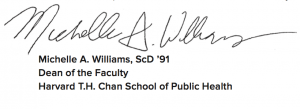I’ve been thinking lately about the word “manifesto.” The dictionary defines it as “a written statement declaring publicly the intentions, motives, or views of its issuer.” But in these divisive times, the word is fraught, conjuring up an entrenched political position, an angry and unyielding attitude toward the world.
The origins of “manifesto,” however, are not nearly so charged. The word comes from the Latin manifestus, meaning “plainly apprehensible, clear, apparent, evident.” Aren’t those some of the watchwords of public health? Isn’t it our mission to make the facts plainly apprehensible? Doesn’t our research make inequities clear and apparent? Aren’t we compelled to ease the all- too-evident suffering of people around the globe?
All of which makes me wonder: What if public health reclaimed the word “manifesto”? What would a modern public health manifesto look like?
First, it would affirm our belief in the power of scientific evidence. Human beings can only advance—and indeed, survive—based on proven facts, not on expedient and fictional alternatives.
Second, it would underscore our collective obligation to invest time and effort in getting at the truth and in acting on what we have learned to set policy.
Third, it would remind us to stay humble. After all, it requires humility to be a public health professional. Although our scientific quest never ends, we are entrusted with the task of improving people’s well-being now. And we are charged with communicating what we know in words and actions that make sense and convey the urgency of our challenges.
Fourth, a manifesto would state that even in the face of uncertainty, we must lead—by mobilizing our allies but also by making common cause with those who oppose us, finding areas of agreement that will help us all move forward.
These themes course through the articles in this issue of Harvard Public Health. Stopping the obesity epidemic—the subject of our extensive cover story—will demand an all-out effort to solve a problem that is abundantly clear, and for which the solutions are equally obvious. Uncovering the secrets of the microbiome may help solve the mysteries of cancer and other diseases. Using social entrepreneurship to lift the burdens of refugees could abet the conventional approaches that often fall short. And eloquently articulating the truth of the immigrant experience—as does Kalé Kponee, SD ’19, a fighter for environmental justice in her Nigerian homeland—is surely an antidote to the angry rhetoric of our times.
Are these some of the tenets of a modern public health manifesto? If so, I’m ready to sign.








